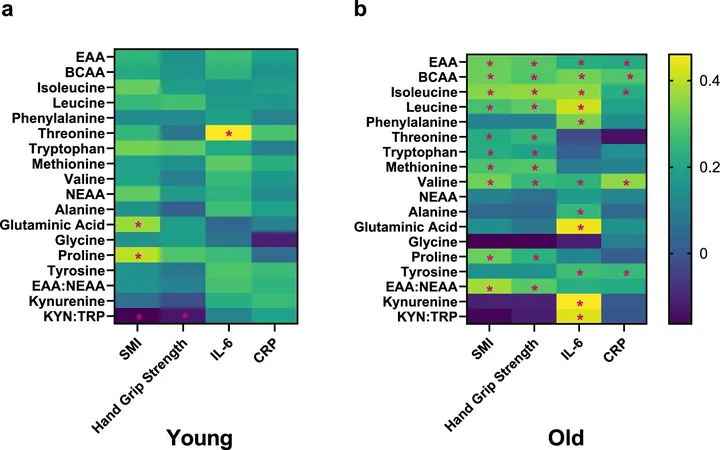
Breakthrough: Revolutionary Drug Candidates Discovered for Formerly “Undruggable” Cancer Target
2025-03-20
Author: Yu
Breakthrough Discovery
In a groundbreaking advancement, scientists have identified innovative drug candidates capable of permanently blocking a notorious cancer protein target that has eluded researchers for years. This discovery, made by researchers at the University of Bath, marks a significant step in the fight against cancer by addressing previously “undruggable” targets.
Role of Transcription Factors in Cancer
Transcription factors, pivotal proteins that act as master switches for gene activity, play a crucial role in cancer progression. Historically, efforts to develop “small molecule” drugs to inhibit these factors have yielded limited success. Thus, researchers have increasingly turned to peptides—small fragments of proteins—as a means to target these challenging proteins.
Novel Strategy Unveiled
This research team has unveiled a novel strategy for discovering peptides that bind selectively and irreversibly to a critical transcription factor known as cJun, which is implicated in driving cancer. Their findings were published in the esteemed journal *Advanced Science*.
The TBS Assay Methodology
The team employed an advanced drug discovery method called the Transcription Block Survival (TBS) assay, which enables the screening of a vast array of peptides. This innovative platform works by identifying peptides that can “switch off” cancerous transcription factors effectively. In earlier studies, the group had demonstrated the ability to create reversible inhibitors of cJun, but this recent work elevates their approach by focusing on irreversible binding mechanisms.
Mechanism of Action
The cJun transcription factor, which consists of two identical halves that bind to DNA, can become hyperactivated in cancer, leading to rampant cell growth. The researchers designed a peptide that binds to one of these halves, preventing it from pairing with its counterpart and attaching to DNA.
Irreversible Binding
Once the binding peptide was developed, the team modified it to create an irreversible bond. Dr. Andy Brennan, the first author of the study and Research Fellow in the University of Bath's Department of Life Sciences, compared the inhibitor's function to that of a harpoon: “It grips cJun tightly and stops it from binding to the DNA.”
Impact of the Peptide Inhibitor
In the TBS assay, the researchers inserted binding sites for cJun into a vital gene within laboratory-grown cells. When cJun binds to this gene, it ceases functioning, leading to cell death. However, with the peptide inhibitor blocking cJun’s action, the gene resumes its activity, allowing the cell to survive.
Innovative Screening Method
Jody Mason, Chief Scientific Officer of Revolver Therapeutics and Professor of Biochemistry at the University of Bath, highlighted the innovative nature of their screening method. He emphasized that many effective drug candidates falter in real biological environments due to toxicity or inability to penetrate cancer cells. Their TBS platform directly tests peptide activity within cells, bypassing many limitations faced by traditional small molecule or antibody-based therapies.
Future Prospects
With preliminary success demonstrated in cancer cells, the researchers are now eager to advance their work into preclinical cancer models. Their hopes are high that this technology will yield additional viable drug candidates targeting other previously considered “undruggable” proteins.
Conclusion
As the fight against cancer continues to evolve, this promising research could pave the way for new treatments, bringing hope to millions affected by this devastating disease. Keep an eye on future developments, as what was once thought impossible may soon become a reality in cancer therapeutics!





 Brasil (PT)
Brasil (PT)
 Canada (EN)
Canada (EN)
 Chile (ES)
Chile (ES)
 Česko (CS)
Česko (CS)
 대한민국 (KO)
대한민국 (KO)
 España (ES)
España (ES)
 France (FR)
France (FR)
 Hong Kong (EN)
Hong Kong (EN)
 Italia (IT)
Italia (IT)
 日本 (JA)
日本 (JA)
 Magyarország (HU)
Magyarország (HU)
 Norge (NO)
Norge (NO)
 Polska (PL)
Polska (PL)
 Schweiz (DE)
Schweiz (DE)
 Singapore (EN)
Singapore (EN)
 Sverige (SV)
Sverige (SV)
 Suomi (FI)
Suomi (FI)
 Türkiye (TR)
Türkiye (TR)
 الإمارات العربية المتحدة (AR)
الإمارات العربية المتحدة (AR)